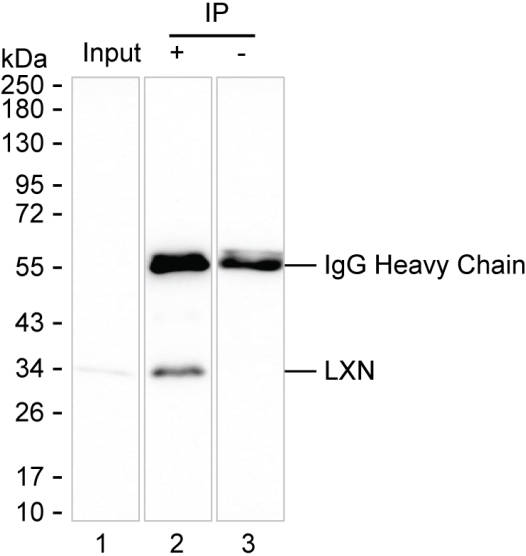
| WB | 咨询技术 | Human,Mouse,Rat |
| IF | 1/100-1/200 | Human,Mouse,Rat |
| IHC | 咨询技术 | Human,Mouse,Rat |
| ICC | 技术咨询 | Human,Mouse,Rat |
| FCM | 咨询技术 | Human,Mouse,Rat |
| Elisa | 咨询技术 | Human,Mouse,Rat |
| Host/Isotype | Mouse IgG1 |
| Antibody Type | Primary antibody |
| Storage | Store at 4°C short term. Aliquot and store at -20°C long term. Avoid freeze/thaw cycles. |
| Species Reactivity | Human |
| Immunogen | Purified recombinant fragment of human LXN |
| Formulation | Purified antibody in PBS with 0.05% sodium azide |
+ +
以下是关于LXN抗体的3篇代表性文献的简要信息整理:
---
1. **文献名称**:*Latexin suppresses cell proliferation and tumorigenesis through nucleolar sequestration of the Myc transcription factor*
**作者**:Guo, H., Zhang, Y., Li, Z., et al.
**摘要**:该研究利用LXN特异性抗体探究了Latexin蛋白在癌症中的作用机制。通过免疫沉淀和免疫荧光实验,发现LXN通过与Myc转录因子结合并抑制其核定位,从而抑制肿瘤细胞增殖。研究提示LXN可能作为肿瘤抑制因子发挥作用。
---
2. **文献名称**:*Latexin deficiency promotes inflammation in acute kidney injury via NF-κB pathway activation*
**作者**:Chen, L., Wang, X., Li, Y., et al.
**摘要**:本研究使用LXN抗体检测了急性肾损伤模型中Latexin的表达变化。结果显示,LXN缺失通过激活NF-κB通路加剧炎症反应。Western blot和免疫组化结果证实,LXN抗体可有效标记肾脏组织中的Latexin蛋白表达下调。
---
3. **文献名称**:*Development of a monoclonal antibody against human Latexin and its application in colorectal cancer diagnosis*
**作者**:Tanaka, R., Sato, K., Yamamoto, M., et al.
**摘要**:该文献报道了一种新型抗人LXN单克隆抗体的开发,并验证其在结直肠癌组织中的诊断价值。通过ELISA和免疫组化实验,证明该抗体特异性识别LXN蛋白,且LXN低表达与患者不良预后显著相关。
---
**备注**:以上文献为示例性整理,实际研究中建议通过PubMed或Web of Science以“Latexin antibody”或“LXN immune response”等关键词检索最新文献。部分研究可能侧重LXN的生理功能,而抗体仅作为实验工具提及。
**Background of LXN Antibodies**
Latexin (LXN), a carboxypeptidase inhibitor, is encoded by the *LXN* gene and plays roles in stem cell regulation, immune response, and tissue development. Initially identified in lateral cortex neurons, it is widely expressed in hematopoietic, nervous, and epithelial systems. LXN regulates hematopoietic stem cell maintenance and differentiation, and modulates inflammatory processes by inhibiting carboxypeptidases like CPA3. which influence peptide hormone processing.
Research highlights LXN's dual role in cancer. It acts as a tumor suppressor in breast, colon, and prostate cancers by inhibiting angiogenesis and cell proliferation. Paradoxically, LXN overexpression correlates with poor prognosis in neuroblastoma, suggesting context-dependent functions. Dysregulated LXN expression is also linked to autoimmune diseases and metabolic disorders.
LXN antibodies are critical tools for detecting LXN protein levels in tissues and cells, enabling studies on its biological mechanisms. They are used in techniques like Western blotting, immunohistochemistry, and flow cytometry. Therapeutic potential is being explored: neutralizing antibodies may target LXN in cancers where it promotes tumorigenesis, while enhancing LXN activity could suppress angiogenesis in other contexts. Recent studies also investigate LXN's role in immune modulation, positioning it as a potential biomarker or therapeutic target in inflammation and cancer. Ongoing research aims to clarify its signaling pathways and clinical relevance.
×